外研社必修1Module 4 A social survey Cultural corner
- 格式:ppt
- 大小:6.26 MB
- 文档页数:56
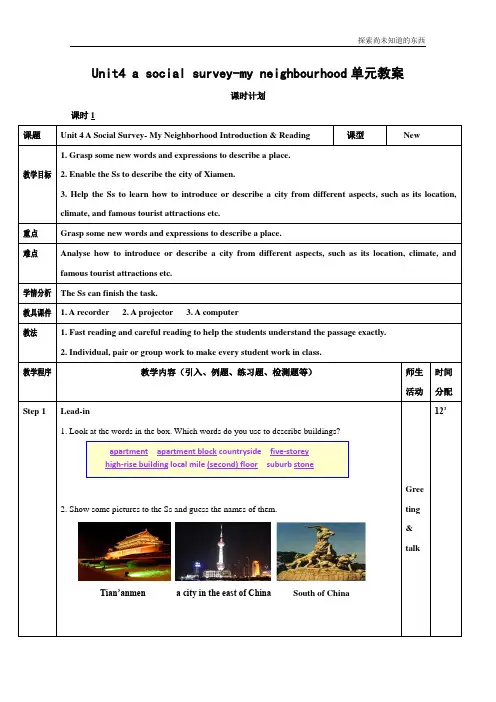
Unit4 a social survey-my neighbourhood 单元教案课时计划课时1课题Unit 4 A Social Survey- My Neighborhood Introduction & Reading 课型New教学目标1. Grasp some new words and expressions to describe a place.2. Enable the Ss to describe the city of Xiamen.3. Help the Ss to learn how to introduce or describe a city from different aspects, such as its location, climate, and famous tourist attractions etc.重点Grasp some new words and expressions to describe a place.难点Analyse how to introduce or describe a city from different aspects, such as its location, climate, and famous tourist attractions etc.学情分析The Ss can finish the task.教具课件 1. A recorder 2. A projector 3. A computer教法 1. Fast reading and careful reading to help the students understand the passage exactly.2. Individual, pair or group work to make every student work in class.教学程序教学内容(引入、例题、练习题、检测题等)师生活动时间分配Step 1 Lead-in1. Look at the words in the box. Which words do you use to describe buildings?2. Show some pictures to the Ss and guess the names of them.Tian’anmen a city in the east of China South of China Greeting&talk12’apartment apartment block countryside five-storey high-rise building local mile (second) floor suburb stoneStep 2Eiffel Tower between the Pacific Ocean and the Indian OceanHave you ever been to this city? The scenery of Gulangyu Island, XiamenReading1. Pre-reading1) Listen to the tape and choose the correct answers.(1) John Martin is visiting ______A_____.(a) Xiao Li’s hometown(b) a town near where Xiao Li lives(c) a shopping mall(2) Xiao Li lives ____B_____.(a) on the island of Gulangyu(b) in Xiamen(c) in a town to the northwest of Xiamen(3) John and Xiao Li are __B__.(a) at Xiao Li’s home(b) driving around the city in a car(c) on a train2. Detail readingRead&learn32’课时计划课时2课时计划课时3重点Find the main idea of the Cultural Corner.难点Find the main idea of the Cultural Corner.学情分析The Ss can finish the task.教具课件 1. A recorder 2. A projector 3. A computer教法 1. Revision to help the students consolidate the language points of this unit.2. Fast reading and careful reading to help the students understand the passage exactly.教学程序教学内容(引入、例题、练习题、检测题等)师生活动时间分配Step 1Step 2Revision1. Recite the text2. Recite New Concept English Book II Lesson 6~10Lead-in1. Listen to a song1) What’s the name of this song?Country road, take me home.2) Can you guess who sing this song?It is sung by John Denver. John Denver is a very famous singer of country music all overthe world.2. While listening to this song, what can we imagine about the western countryside?Cultural Corner1. Listen the text and answer the following question.10’8’课时计划课时4课时计划课时5。
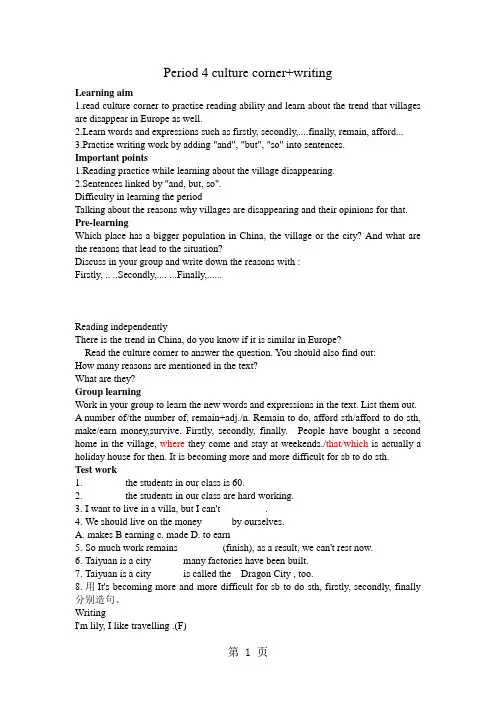
Period 4 culture corner+writingLearning aim1.read culture corner to practise reading ability and learn about the trend that villages are disappear in Europe as well.2.Learn words and expressions such as firstly, secondly,....finally, remain, afford...3.Practise writing work by adding "and", "but", "so" into sentences.Important points1.Reading practice while learning about the village disappearing.2.Sentences linked by "and, but, so".Difficulty in learning the periodTalking about the reasons why villages are disappearing and their opinions for that. Pre-learningWhich place has a bigger population in China, the village or the city? And what are the reasons that lead to the situation?Discuss in your group and write down the reasons with :Firstly, .. ..Secondly,.... ...Finally,......_____________________________________________________________________ _____________________________________________________________________ _____________________________________________________________________ Reading independentlyThere is the trend in China, do you know if it is similar in Europe?Read the culture corner to answer the question. You should also find out:How many reasons are mentioned in the text?What are they?Group learningWork in your group to learn the new words and expressions in the text. List them out.A number of/the number of, remain+adj./n. Remain to do, afford sth/afford to do sth, make/earn money,survive. Firstly, secondly, finally. People have bought a second home in the village, where they come and stay at weekends./that/which is actually a holiday house for then. It is becoming more and more difficult for sb to do sth.Test work1.________the students in our class is 60.2.________the students in our class are hard working.3.I want to live in a villa, but I can't_________.4.We should live on the money______by ourselves.A.makes B earning c. made D. to earn5.So much work remains_________(finish), as a result, we can't rest now.6.Taiyuan is a city ______many factories have been built.7.Taiyuan is a city ______is called the Dragon City , too.8.用It's becoming more and more difficult for sb to do sth, firstly, secondly, finally 分别造句。
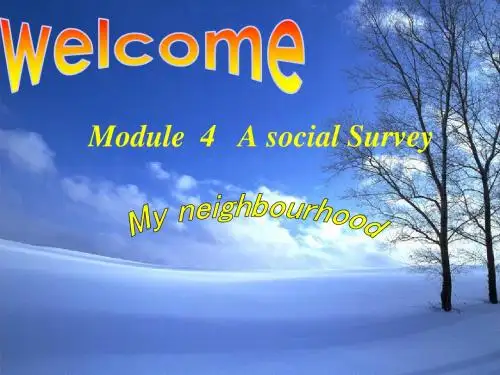

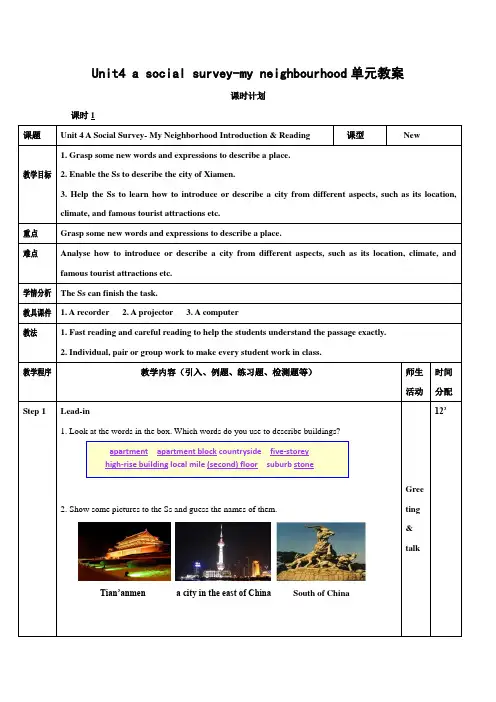
Unit4 a social survey-my neighbourhood单元教案课时计划课时1课题Unit 4 A Social Survey- My Neighborhood Introduction & Reading 课型New教学目标1. Grasp some new words and expressions to describe a place.2. Enable the Ss to describe the city of Xiamen.3. Help the Ss to learn how to introduce or describe a city from different aspects, such as its location, climate, and famous tourist attractions etc.重点Grasp some new words and expressions to describe a place.难点Analyse how to introduce or describe a city from different aspects, such as its location, climate, and famous tourist attractions etc.学情分析The Ss can finish the task.教具课件 1. A recorder 2. A projector 3. A computer教法 1. Fast reading and careful reading to help the students understand the passage exactly.2. Individual, pair or group work to make every student work in class.教学程序教学内容(引入、例题、练习题、检测题等)师生活动时间分配Step 1 Lead-in1. Look at the words in the box. Which words do you use to describe buildings?2. Show some pictures to the Ss and guess the names of them.Tian’anmen a city in the east of China South of China Greeting&talk12’apartment apartment block countryside five-storey high-rise building local mile (second) floor suburb stoneEiffel Tower between the Pacific Ocean and the Indian Ocean Have you ever been to this city? The scenery of Gulangyu Island, XiamenReading1. Pre-reading1) Listen to the tape and choose the correct answers.(1) John Martin is visiting ______A_____.(a) Xiao Li’s hometown(b) a town near where Xiao Li lives(c) a shopping mall(2) Xiao Li lives ____B_____.(a) on the island of Gulangyu(b) in Xiamen(c) in a town to the northwest of Xiamen(3) John and Xiao Li are __B__.(a) at Xiao Li’s home(b) driving around the city in a car(c) on a train2. Detail reading Read&learn32’Step 2课时计划课时2课时计划课时3重点Find the main idea of the Cultural Corner.难点Find the main idea of the Cultural Corner.学情分析The Ss can finish the task.教具课件 1. A recorder 2. A projector 3. A computer教法 1. Revision to help the students consolidate the language points of this unit.2. Fast reading and careful reading to help the students understand the passage exactly.教学程序教学内容(引入、例题、练习题、检测题等)师生活动时间分配Step 1 Step 2 Revision1. Recite the text2. Recite New Concept English Book II Lesson 6~10Lead-in1. Listen to a song1) What’s the name of this song?Country road, take me home.2) Can you guess who sing this song?It is sung by John Denver. John Denver is a very famous singer of country music all overthe world.2. While listening to this song, what can we imagine about the western countryside?Cultural Corner1. Listen the text and answer the following question.10’8’课时计划课时4课时计划课时5。
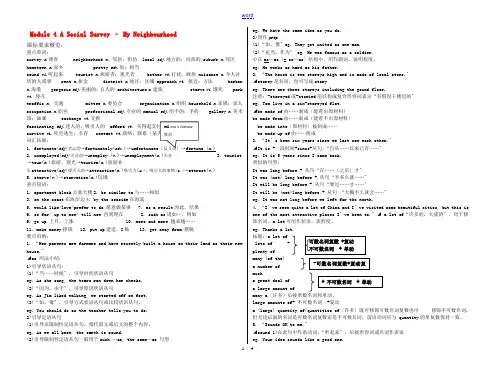
Module 4 A Social Survey – My Neighbourhood课标要求概览:重点单词: survey n.调查 neighborhood n . 邻居;街坊 local adj .地方的;局部的 suburb n .郊区 hometown n .家乡 pretty adv .很;相当 sound vi .听起来 tourist n .旅游者;观光者 bother vt .打扰;麻烦 nuisance n .令人讨厌的人或事 rent n .租金 district n .地区;区域 approach vt . 接近;方法 harbor n .海港 gorgeous adj .美丽的;宜人的 architecture n .建筑 starve vi .饿死 park vt . 停车 traffic n . 交通 mittee n .委员会 organization n .组织 household n .家属;家人 occupation n .职业 professional adj .专业的 manual adj .用手的;手的 gallery n .美术馆;画廊 exchange vt .交换 fascinating adj .迷人的;吸引人的 afford vt . survive v i.死里逃生;幸存 contact vt .词汇拓展: 1. fortunate(adj)幸运的→fortunately(adv .)→unfortunate 〕→fortune (n .) 2. unemployed(adj)失业的→unemploy (v .)→unemployment(n .)失业 3. tourist →tour(n .)旅游,观光→tourism(n .)旅游业 4.attractive(adj)吸引人的→attraction(n .)吸引力(u.);吸引人的事物(c.)→attract(v .) 5. starve(v .)→starvation(n .)饥饿 重点短语: 1. apartment block 公寓大楼2. be similar to 与……相似 3. on the coast 在海岸边4. by the seaside 在海滨 5. would like/love/prefer to do 愿意做某事 7. as a result 因此,结果 6. so far/ up to now/ till now 直到现在 8. such as 诸如…,例如 9. go up 上升,上涨 10. more and more 越来越…… 11. make money 挣钱 12. put up 建造,X 贴 13. get away from 摆脱 要点归纳: 1. “Her parents are farmers and have recently built a house on their land as their new house.〞 ◢as 用法小结: 1)引导状语从句: (1)“当……时候〞,引导时间状语从句 eg. As she sang, the tears ran down her cheeks. (2)“因为,由于〞,引导原因状语从句 eg. As Jim liked walking, we started off on foot. (3)“如,像〞,引导方式状语从句或比较状语从句。
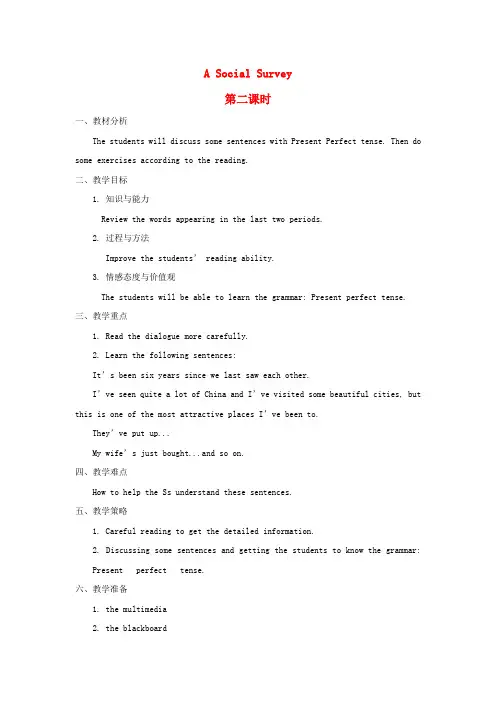
A Social Survey第二课时一、教材分析The students will discuss some sentences with Present Perfect tense. Then do二、教学目标1. 知识与能力2. 过程与方法Improve the students’ reading3. 情感态度与价值观The students will be able to learn the grammar:三、教学重点1.2. Learn the following sentencesI’ve seen quite a lot of China and I’ve visited some beautiful cities, but四、教学难点五、教学策略1. Careful reading to get2. Discussing some sentences and getting the students to know the grammar:六、教学准备1.2.七、教学环节(一)课堂引入(Get the Ss to review some words in the Reading part. Show the following on((((((( )ca((((((Suggested answers1.lucky2.very hot3.give you problems4.causing problems5.shoppingcenter7.T: Next please look at these words. Who can read them?T: Li Ming,L:(二)课堂讲授(Get the students to read the dialogue again. After a while, show the sentences,1.2.3.4.(Make sure that the students know how to use and and but and understand these sentences, especially the form of the Present perfect tense.)Then ask some good students to read the dialogue.(三)课堂练习T: Let’s carry on a dialogue.T: Hi,W: Hi, I’mW: When did you come here?T: Yesterday. I’m here to attend a meeting. And I want to go to the library. Can you show me the way?W: Oh. Follow this road and take the first right. Keep straight on, and you willT: Thank you very much. Good-bye. W: Bye-bye.T: Very good. Thank you for your cooperation. Now all of you carry on a dialoguelike this. Are you clear about that?T: OK. Begin,(After a while,(四)课堂活动(五)In order to make the students know more about China and New Zealand(The foreign teacher in our school comes from New Zealand . If they don’t know much about New Zealand, they can interview her. Get them to compare the climate inChina(五)课堂小结 1.1. It has a mild sea climate.(六)作业布置T: Today we have learned some useful expressions. After class, read the dialogue,put the useful expressions into heart and preview the next part, Grammar! That’s all for today. Class is over.八、板书设计Module 4-2.have p5....and. ..,九、教学反思。
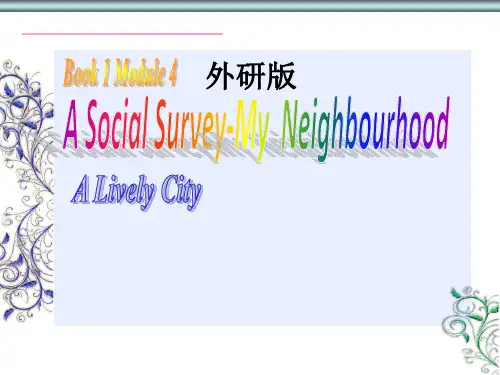
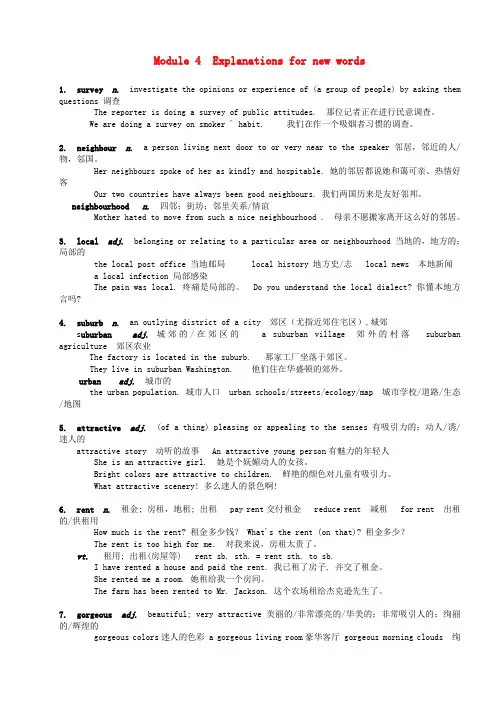
Module 4 Explanations for new words1. survey n. investigate the opinions or experience of (a group of people) by asking them questions 调查The reporter is doing a survey of public attitudes. 那位记者正在进行民意调查。
We are doing a survey on smoker ' habit. 我们在作一个吸烟者习惯的调查。
2. neighbour n. a person living next door to or very near to the speaker邻居,邻近的人/物,邻国。
Her neighbours spoke of her as kindly and hospitable. 她的邻居都说她和蔼可亲、热情好客Our two countries have always been good neighbours. 我们两国历来是友好邻邦。
neighbourhood n. 四邻;街坊;邻里关系/情谊Mother hated to move from such a nice neighbourhood . 母亲不愿搬家离开这么好的邻居。
3. local adj. belonging or relating to a particular area or neighbourhood 当地的,地方的;局部的the local post office 当地邮局 local history 地方史/志 local news 本地新闻a local infection 局部感染The pain was local. 疼痛是局部的。
Do you understand the local dialect? 你懂本地方言吗?4. suburb n. an outlying district of a city 郊区(尤指近郊住宅区),城郊s uburban adj.城郊的/在郊区的 a suburban village 郊外的村落suburban agriculture 郊区农业The factory is located in the suburb. 那家工厂坐落于郊区。
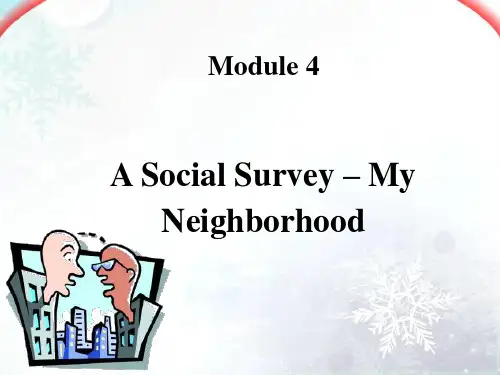
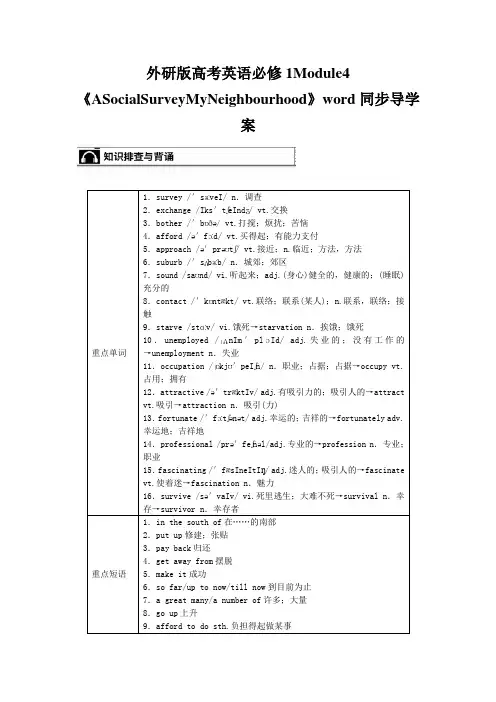
外研版高考英语必修1Module4《ASocialSurveyMyNeighbourhood》word同步导学案重点单词1.survey /′sɜːveI/ n.调查2.exchange /Iks′tʃeIndʒ/ vt.交换3.bother /′bɒðə/ vt.打搅;烦扰;苦恼4.afford /ə′fɔːd/ vt.买得起;有能力支付5.approach /ə′prəʊtʃ/ vt.接近;n.临近;方法,方法6.suburb /′sʌbɜːb/ n.城郊;郊区7.sound /saʊnd/ vi.听起来;adj.(身心)健全的,健康的;(睡眠)充分的8.contact /′kɒntækt/ vt.联络;联系(某人);n.联系,联络;接触9.starve /stɑːv/ vi.饿死→starvation n.挨饿;饿死10.unemployed /ˌʌnIm′plɔId/ adj.失业的;没有工作的→unemployment n.失业11.occupation /ˌɒkjʊ′peIʃn/ n.职业;占据;占据→occupy vt.占用;拥有12.attractive /ə′træktIv/ adj.有吸引力的;吸引人的→attract vt.吸引→attraction n.吸引(力)13.fortunate /′fɔːtʃənət/ adj.幸运的;吉祥的→fortunately adv.幸运地;吉祥地14.professional /prə′feʃnəl/adj.专业的→profession n.专业;职业15.fascinating /′fæsIneItIŋ/ adj.迷人的;吸引人的→fascinate vt.使着迷→fascination n.魅力16.survive /sə′vaIv/ vi.死里逃生;大难不死→survival n.幸存→survivor n.幸存者重点短语1.in the south of在……的南部2.put up修建;张贴3.pay back归还4.get away from摆脱5.make it成功6.so far/up to now/till now到目前为止7.a great many/a number of许多;大量8.go up上升9.afford to do sth.负担得起做某事经典句型1.It’s been six years since we last saw each other,you know. 要明白,我们六年没见面了。